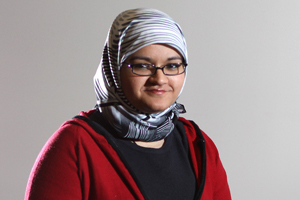Opinion: Holy war or something more?
March 6, 2012
Fiza Shah
Fiza Shah is a freshman news major and columnist for the Daily Kent Stater. Contact her at [email protected].
I would like to first take the next couple of columns to talk about two issues that were brought up countless times, not only in the comments of my last article but also anytime a debate regarding Islam ensues: Terrorism/Jihad and Sharia Law.
Since the tragic events of 9/11, the word jihad has become synonymous with terrorism. When a terrorism act is reported on one of the many news outlets, often the words “jihadist extremist” or “jihadist terrorists” are used.
This is in direct contrast with what the Qur’an and Hadith say about war. How can a Book that says, in Surat Al-Ma’idah verse 32, “Whoever kills a person … it is as though he has killed all mankind entirely. And whoever saves one — it is as if he had saved mankind entirely.” There is an irreconcilable difference between this verse and the perception the West has of Islam. It stands to reason one of these views is false.
That being said, what is jihad?
The word “jihad” translates into “struggle.” This struggle is divided into two categories: internal and external.
The internal struggle is known as the greater jihad because it is much more pleasing to God than the external.
This “greater jihad” is the successful struggle to refrain from what God forbids, and do what He commands, all in an effort to please Him and get closer to Him.
What many people don’t realize is that Islam is not just a code of beliefs, but is rather a way of life. Islam gives direction for Muslims in every part of their lives, whether it’s personal, financial, societal, etc.
It’s often difficult to follow all of these commands of God, especially while living in a secular society. For example, Islam forbids drinking alcohol of any form. As a teenager living in the United States, it can be tempting to drink, just once, in order to fit in with a group. This struggle to maintain one’s beliefs in face of challenge is a sort of personal, inner jihad.
The lesser jihad is the outward struggle. While this can include a fight on the battlefield, it also encompasses every action that one takes toward others and his community for the sake of pleasing God.
For example, I’m writing this article in order to (hopefully) further a better understanding of the teachings of Islam. If my actions are to please God and God alone and further my own spirituality, then it is a sort of jihad.
Then, we come to the physical jihad on the battlefield, a part of the lesser jihad. However, this jihad is nothing like what is portrayed and advocated in the media, also known as terrorism. There is certain criteria that need to be met in order for a jihad to be legitimate.
Firstly, jihad can only be used in defense of life, territory and faith.
Secondly, the intention should be to draw closer and please God. Simply fighting to acquire property or honor is not a valid reason to go to war.
Thirdly, women, children, the disabled, the elderly or anyone else who has immunity from the war cannot be attacked. Neither can those combatants who are running away from battle. In combat, use of mutilation or unnecessary force is also not allowed.
Suicide, for any reason, is a sin in Islam. There is a hadith in which the Prophet and his companions were looking onto a battlefield. They saw one specific man, fighting extremely bravely. The companions said the soldier must have been going to heaven, judging by the bravery with which he fought. However, the Prophet declared that this soldier was hell-bound. The companions were stunned, asking how such a sacrifice could be wasted. As they spoke, they saw the soldier lying on the ground in extreme pain. Not being able to bear the pain, he killed himself. Suicide erased all the bravery with which he fought.
Now that you know some of the criteria for jihad, answer me this: Does modern-day terrorism fit any of the criteria listed above?









